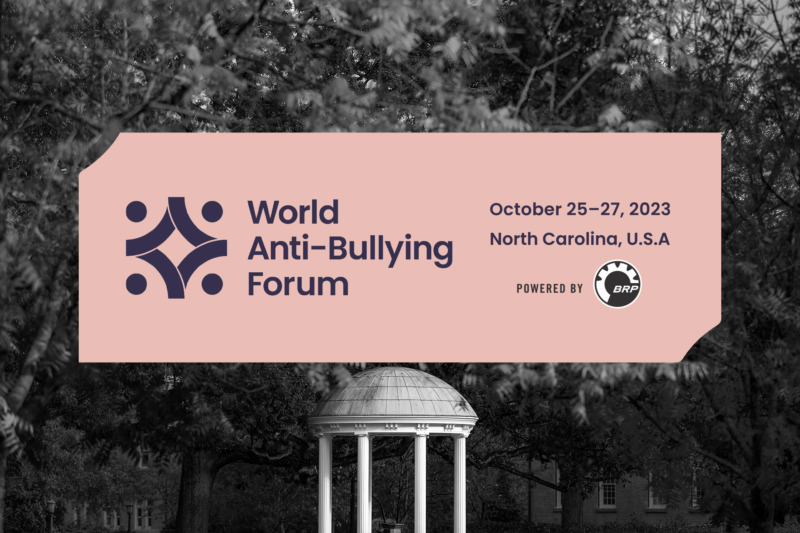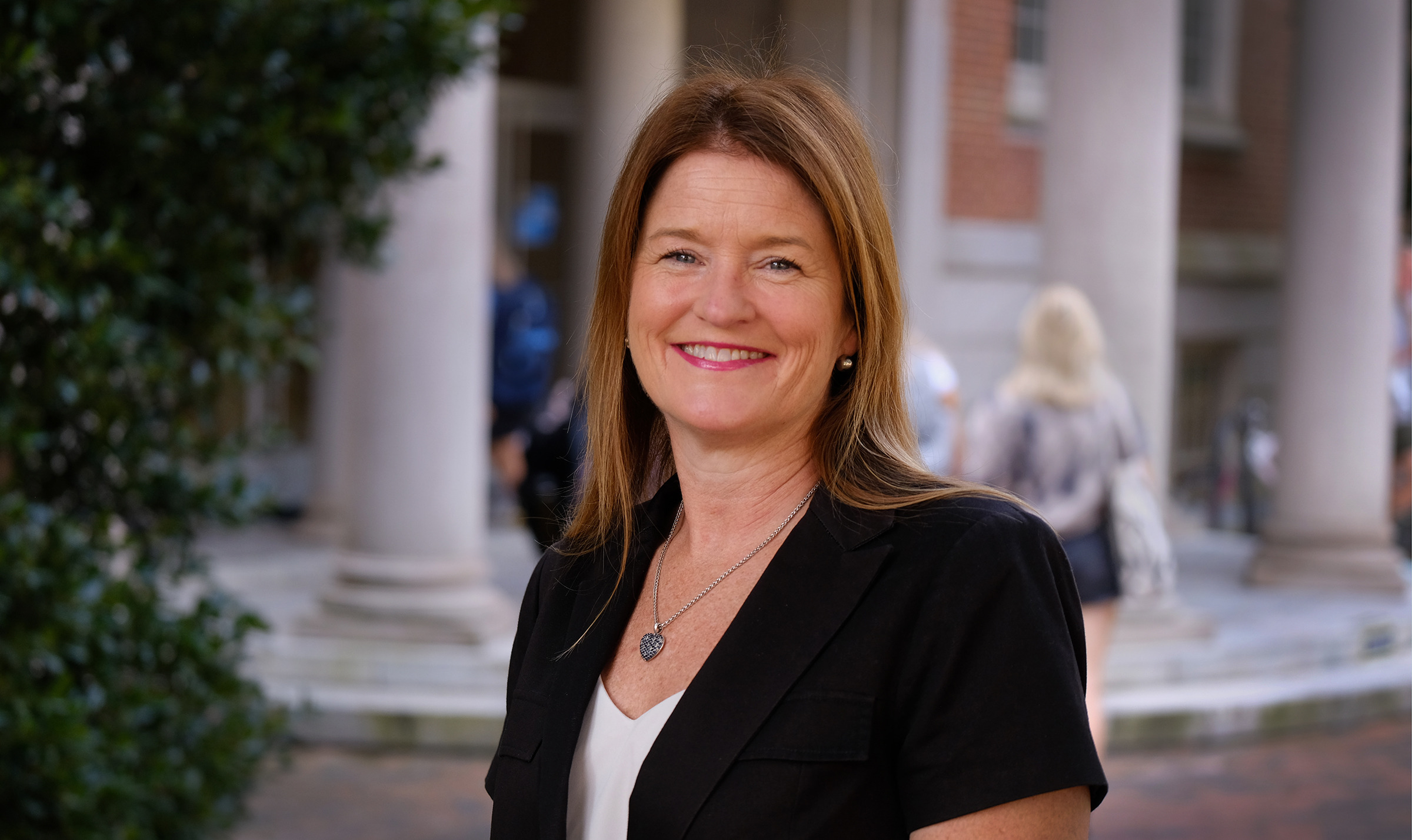On Oct. 25-27, 2023, the UNC School of Education will host the World Anti-Bullying Forum (WABF). This marks a historic moment as WABF ventures outside of Europe, having been hosted in Sweden in 2017 and 2021 and in Ireland in 2019.
The World Anti-Bullying Forum is a biennial event that plays a crucial role as a global meeting place for international researchers, practitioners, policymakers, and youth advocates committed to prevent bullying. It serves as a platform for the dissemination of research, advocacy, network building, and content sharing.
UNC School of Education faculty member Dorothy Espelage, Ph.D., is the organizer of WABF 2023. Espelage, the School’s William C. Friday Distinguished Professor of Education, has dedicated more than 25 years to research and evidence-based methodologies pertaining to bullying prevention and intervention programming. In that time, she has amassed a global network of collaborators who share a common purpose: addressing concerns related to youth well-being, social-emotional learning interventions, and the prevention of bullying.
The Forum — powered by BRP, a global leader in the world of powersports products, propulsion systems, and boats — will bring together an array of participants, including researchers, practitioners, policymakers, education leaders, professionals, and engaged community members at the Raleigh Convention Center to explore the latest trends in bullying prevention and address various forms of violence among children. This Forum aims to foster meaningful discussions on research-based knowledge and best practices for preventing bullying among children on a global scale.
Below is a Q&A with Espelage about aspects of the upcoming event that she is looking forward to, key themes around bullying prevention that will be prevalent among presenters, and more.

Based on the presentation submissions, what are some of the major themes emerging related to bullying and its prevention?
As the forum approaches, we have reviewed a variety of presentation submissions that represent a unique perspective on the complex issue of bullying and its prevention. One of the most prevalent themes was the intersection of bullying and social media. Many presenters aim to dissect the alarming rise of cyberbullying and online harassment, shedding light on the various challenges and implications of this digital dimension of bullying prevention. Discussions will range from the impact of social media platforms to strategies for addressing these issues in an increasingly interconnected world.
Additional key themes include innovative prevention methods beyond traditional programs, reconsidering the definition of bullying, the importance of bystander intervention, identity-based bullying, teachers’ roles, and the connection between hate and bullying. These presentations will provide a multifaceted understanding of bullying and spark collaborative discussions to develop impactful strategies against it — with the overarching goal of discovering new and effective methods to prevent bullying as society evolves.
As we developed the Forum’s agenda, it was clear that these emerging themes would provide a detailed understanding of bullying and its prevention. They would serve as a foundation for insightful discussions, collaboration, and the development of strategies to combat bullying in all its forms. We’re excited about the impact of this diverse array of presentations in the ongoing battle against bullying.
Thinking about the presentations, what appear to be some of the common challenges schools and communities still face around addressing bullying?
Common challenges that schools and communities still face around addressing bullying encompass various facets. Presenters will share opportunities for improvement in the context of time demands on teachers and schools, resources for implementation, implementing with fidelity, and addressing bullying across different age groups.
Multiple presentations will cover teacher and school challenges in allocating time for consistent bullying prevention amidst competing priorities. Researchers will provide strategies for efficiently integrating anti-bullying programs into busy school schedules and securing necessary resources. They will also emphasize high-fidelity implementation and consistency. Additionally, the Forum has incorporated sessions focusing on tailored strategies for elementary, middle, and high school students, addressing age-specific risk factors, interventions, and positive school climates.
Are there any particular presentations or sessions you’re most looking forward to at the conference?
ALL OF IT! WABF is a gathering of like-minded advocates, researchers, educators, and policymakers, all striving for the same goal — making the world a safer place for young people. My journey in this field has been profound and humbling, and I know the various sessions will deliver understandings and perspectives with both of those qualities.
Through the key themes, including the relationship between bullying and social media, innovative prevention methods beyond traditional programs, reconsidering the definition of bullying, and many others, the Forum’s presentations will bring comprehensive meaning to complex issues and enrich discussions on effective strategies to address bullying in all its modern forms.
For me, WABF is not just about acquiring knowledge; it is a celebration of shared dedication, collaboration, and the passionate pursuit of a safer world for all. The “ALL OF IT!!” response wasn’t just an expression of enthusiasm; it was an acknowledgment of the endless possibilities, the transformational discussions, and the connections with colleagues, peers, and fellow bullying prevention advocates.
As the event approaches, how do you think this conference might inform your work in bullying prevention and intervention? What insights are you hoping to gain?
WABF holds the potential to significantly inform and enrich my work in the field of bullying prevention and intervention. In the dynamic and ever-evolving landscape of bullying, staying updated with the latest research, strategies, and best practices is essential to creating effective prevention programs and providing meaningful support to those impacted by bullying.
Forums like this offer a unique opportunity to engage with experts, practitioners, and academics from diverse backgrounds and regions. These interactions can shed light on the evolving nature of bullying and its various manifestations, helping to adapt and inform my work. I am also excited for my graduate and undergraduate students to experience WABF as emerging researchers, connecting with potential collaborators and expanding their work. I know this conference will provide them with new insights.
Additionally, networking and engaging in dialogues with professionals who have experience in bullying prevention can lead to valuable collaborations and partnerships, fostering a more holistic approach to the issue. By embracing the different perspectives and the potential for innovation, I hope we all come away with a varied understanding from peers about how they are addressing this critical issue on a global scale.
